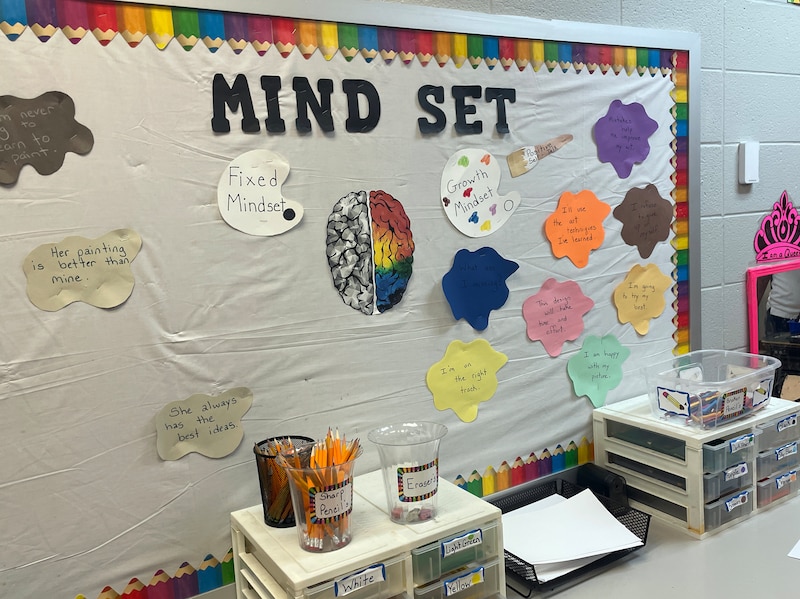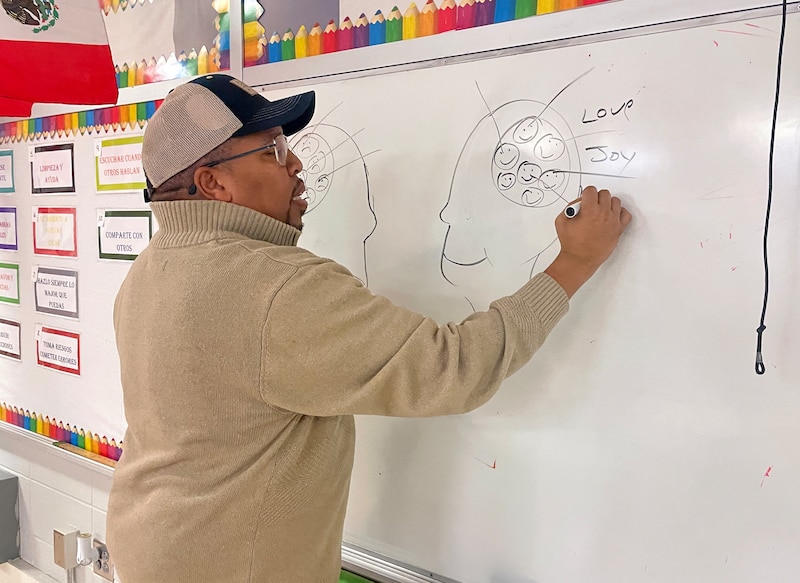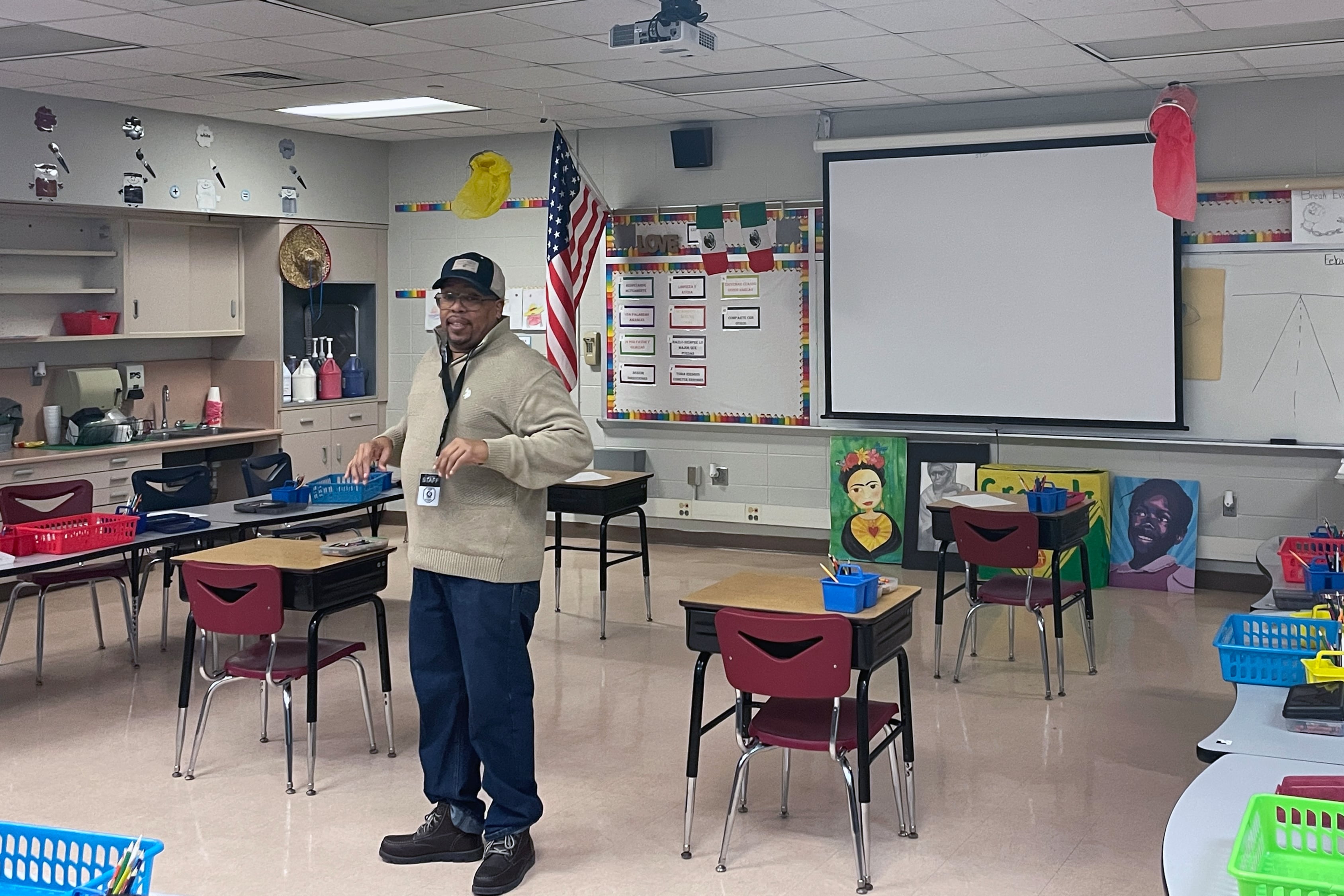Sign up for Chalkbeat’s free monthly newsletter How I Teach to get inspiration, news, and advice for — and from — educators.
It’s “fun Friday” in Makeba Averitte’s art class at Liberty Grove Schools, a K-6 Innovation charter school on the northwest side of Indianapolis.
Fourth graders file in, and he tells them to start by taking two Valentine’s Day coloring sheets and two Black History Month coloring sheets. When they are done, Averitte will hang the latter set in the school’s hallways, but the valentines are for students to give to family, he said.
Averitte’s classroom is filled with color and art from the paint buckets hanging from the ceiling to artwork, including his own, on the walls and cabinets. But it’s also filled with supplies for life: shelves of clothes and a “care cabinet” of hygiene items for students in need. Positive affirmations adorn the walls for students to recite in corresponding King and Queen mirrors. Averitte even keeps hair clippers in his desk for students in need of a haircut.
He fuses history and language lessons with art and talks to students about their emotions, too. Averitte does this all with a big smile and sometimes a dance.
Growing up, Averitte said his teachers didn’t understand what he was going through at home, and how he used humor to distract from his pain. But now, as a teacher himself, he aims to boost students’ self-confidence and open their minds to new ideas. It’s being a part of their village.
“A village means that everyone is doing their part, everybody’s got a role, everybody plays a part,” he said. “It’s a better world.”

Averitte spoke to Chalkbeat Indiana about merging art with life lessons, building a village, how his mom learned to read as an adult, and the best advice he’s received.
This interview has been lightly edited for length and clarity.
How and when did you decide to become a teacher?
It never dawned on me, but I always understood the importance of the village. I enrolled my child as a kindergartener at what was then Ignite Achievement Academy (in the same building that Liberty Grove is in now), and when the school held community discussions on the importance of the village, I shared my story. Someone saw something in me, and in 2017, I was hired as an assistant PE teacher, initially. Then, I started offering art as enrichment classes. The rest is history. I’ve been teaching art at Liberty Grove Schools for three years.
What’s your favorite lesson to teach and why?
Actually, I love art and social-emotional teaching. I love art because it allows children to see what I saw in art as a kid and currently. You can take a blank piece of paper and turn it into life.
Sometimes students aren’t sure they can create something. Then, I help them see the art in their name, like how the letter A in a name can be the roof of a house. Then, when I see a child turn that letter A into a Christmas tree or something else, it’s amazing. I love seeing their reaction to something they’ve created as well as the confidence they gain when they see they’ve created something amazing.
I also love teaching life skills and coping skills. Bottled-up feelings affect our growth and development all around. It can affect our confidence, our dreams, and more. The same is true for children, and we can help them understand that it directly helps their growth and development. Plus, I really enjoy teaching life skills to students and mentoring others — students and parents, even. For families, we are all on a journey, and I want to remind them that they are not alone. It really is all connected. The village. And that’s how we help prepare students in the classroom, in life, and beyond.
How has your role as the president of the school’s parent advisory council impacted you and your work?
My target is to work with parents and children. That’s how we — the village — help students achieve academically and thrive in life. They are the future. They are making changes in this life, right now, just like the youth of our history who were game changers. We have a role in this life to encourage them every step of the way. This position allows me to share who I am, where I’ve been, and where I am going and encourage them. I want to build up parents on that journey, especially as I reflect on my life and my parent — my mother.
For example, my mother used Indy Reads, and seeing her grow because of it and other times she persevered inspires me. So I share my journey, connections, and resources, like Indy Reads, with families. It really is all connected.
I heard you like to help students work toward their dreams for future careers. How do you do that?
This is a part of my every day. For example, I created a class assignment where I asked students to create their own business logo. They did an amazing job. I saw their excitement and then I encouraged their dreams further by creating flyers for students that showcased the dreams they’ve shared. I have future brain surgeons, hair stylists, nail techs, a photographer, and more in my classes!
Sometimes, I’ve even purchased things to coincide with those dreams, like a stethoscope or scrubs, a camera, and more. My job is to help students dream big and believe in themselves. And when they do, students lock in and work towards those goals in different ways.

What’s the best advice you’ve ever received, and how have you put it into practice?
My mom shows how she never gave up on my brother and I, despite her struggles in life. One major dilemma was that she was illiterate. Through my mother’s action and sacrifice, she took it upon herself to seek help to better her education with Indy Reads’ adult literacy program. In her journey as a single mother, she proved to my brother and I that you can do anything that you set your mind to, no matter what you’ve been through. My mother received multiple awards from Indy Reads, including awards for leadership, achievement, and student of the year.
When I was a kid, my mom owned a neighborhood candy store, and she told the kids in the neighborhood if they showed her their report card with good grades, she will give them a bag of free candy. My mom showed me what the saying, “It takes a whole village,” looks like, as well as the saying “All hands on deck.”
It was less of what someone said and more of what they did. My mother showed me a lot, and I am grateful for her. She showed me that, no matter what, you got to stick it out when it comes to learning. She did that.
To me, that’s what helps students go far — the resilience, the push through, the knowledge and academics, and the know-how regarding how to apply it as they dream big and reach for their goals. The students are already amazing. I am grateful for the opportunity to help them see that so they can tap in and shine even more.
This story has been updated to clarify which school Averitte’s daughter first attended.
MJ Slaby oversees Chalkbeat Indiana’s coverage as bureau chief. Contact MJ at mslaby@chalkbeat.org.





